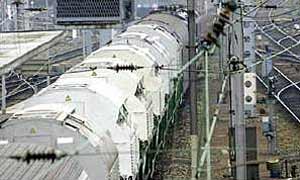
New Managing Director for Bellona Norway
The Board of the Bellona Foundation has appointed former Minister of Climate and the Environment Sveinung Rotevatn as Managing Director of Bellona No...
News

Publish date: March 17, 2003
Written by: Zackary Moss
News
A Direct Rail Services, or DRS, locomotive delivering an empty irradiated nuclear flask to Hinkley Point nuclear power plant in Somerset, south-west England, became partially derailed while travelling slowly at Bridgwater station March 13th
Nuclear train derails
A set of wheels on the DRS nuclear freight train jumped off the track just outside a secure nuclear compound where highly-radioactive fuel containers from Sellafield are loaded and unloaded, according to reports in the British media. The 50-tonne flask — which is a heavily-shielded, lead-lined container built from forged steel more than 30cm thick — was empty at the time of the accident.
The flask was housed under a locked cover, fastened to the rail carriage for transportation.
A spokesman for DRS said the incident happened in a freight yard away from the main line and involved one locomotive of a pair, although it had no effect on the flask or the carriage carrying it.
An investigation is to be held into a derailment involving the DRS train.
Blair pledges security review
A nine-fold increase in the number of safety scares involving the transportation of nuclear material has prompted an urgent security review of nuclear material transportation by British Prime Minister Tony Blair, the Observer reported March 16th.
New figures show that the number of incidents involving nuclear materials on railways, roads, waterways and in the air rose from four in 1972 to 35 in 2001.
In a letter to Norman Baker, the Liberal Democrat environment spokesman, Tony Blair detailed his intention to review: Security arrangements for the carriage of dangerous goods generally and radioactive materials.
Mr Blair has pledged to speed up measures to protect convoys, trains and ships carrying nuclear material from terrorist attack — prompted by the events of September 11th 2001. In fact, British intelligence has repeatedly warned that terrorist acts involving nuclear material could be carried out on mainland Britain.
Mr Blair also admitted that a loophole allows high-level radioactive material can be carried on ferries, although anti-nuclear campaigners have repeatedly called for it to be closed.
They have also called for a sharp reduction in the movement of radioactive materials.
According to BNFL, alongside continuous audits and reviews of security, undertaken with the Office of Civil Nuclear Security, additional work has been undertaken to assure the security arrangements for these movements are suitable in the current climate.
Calls to end nuclear transports
Nuclear material from nuclear power plants is transported by rail to Sellafield. The spent fuel rods — which are carried in lead-lined flasks — are highly radioactive.
Campaigners fear a high-speed derailment could damage the flask, allowing material to escape and leading to the risk of contamination.
A train carrying an empty flask from Willesden in North London to Dungeness A power station collided with a lorry at a level crossing in Kent, south-west England, in 2002. The incident was classed as a road traffic incident, as the van driver involved was found to have crossed the crossing on a stop signal.
In 2001, a railway tanker designed to carry highly-radioactive spent nuclear fuel was derailed in East Lothian in Scotland while carrying an empty 50-tonne flask.
Nuclear safety analysts are calling for the safe height for a flask to fall to be raised from nine metres to 600 metres.
Calls are also mounting to halt the practice of transporting weapons-grade nuclear material on Britain’s congested roads. British military transports regularly use motorways such as the M4 — which runs from South Wales to West London — and the M25 London orbital with nuclear material carried in special lorries, shadowed by support vehicles carrying decontamination equipment for use in the event of an accident.

The Board of the Bellona Foundation has appointed former Minister of Climate and the Environment Sveinung Rotevatn as Managing Director of Bellona No...

Økokrim, Norway’s authority for investigating and prosecuting economic and environmental crime, has imposed a record fine on Equinor following a comp...

Our op-ed originally appeared in The Moscow Times. For more than three decades, Russia has been burdened with the remains of the Soviet ...

The United Nation’s COP30 global climate negotiations in Belém, Brazil ended this weekend with a watered-down resolution that failed to halt deforest...